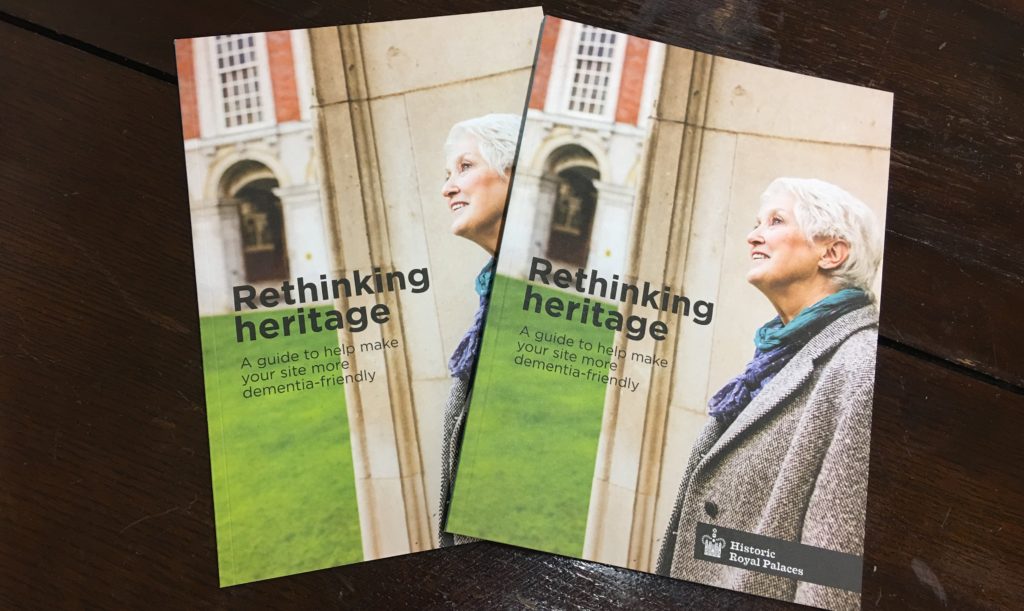A pioneering guide to help heritage sites across Britain become more dementia friendly is being launched at Beamish, The Living Museum of the North.
Organisations across the country, including Beamish, Historic Royal Palaces and English Heritage, have worked together to produce the first ever Dementia Friendly Heritage Guide, which is championed by the Alzheimer’s Society and the Heritage Lottery Fund.

The guide aims to help museums, stately homes, parks and other heritage venues to become more dementia friendly and features practical advice from organisations who use innovative ways to engage with visitors who are living with dementia. Download the guide at www.alzheimers.org.uk/heritage.
Heritage sites are often at the heart of local communities and are regularly visited by people of all ages, to reminisce, explore history and relax. However, they can be intimidating and disorientating for the 850,000 people in the UK who are living with dementia. The guide highlights the creative ways heritage organisations have been responding to this challenge.
A launch of the guide is taking place at Beamish, The Living Museum of the North on Wednesday, 6th December. Representatives from heritage, NHS and local goverment organisations from across the North, Scotland and the Midlands will be attending.
Beamish, in County Durham, holds pioneering sessions and groups for people living with dementia and their families and carers, including activities in Orchard Cottage at its 1940s Farm. Around 400 of the open air museum’s staff and volunteers are Dementia Friends and wear special crocheted versions of the forget-me-not badge, in keeping with their period costumes. The museum is building a centre for older people, including those living with dementia, in aged miners homes in a 1950s Town, which is currently under construction as part of the £18millon Remaking Beamish project.
Rhiannon Hiles, Beamish’s Deputy Director, said: “We are extremely honoured to be hosting the launch of the Dementia Friendly Heritage Guide. We were delighted to be part of this guide and to support the campaign to help heritage sites across the country to become more dementia friendly.
“The wellbeing of people living with dementia, and their families and carers, is very important to us. We’re very proud of the work we do here at the museum. We hope heritage organisations will join this campaign and do whatever they can to become more dementia friendly.”
Sir Tony Robinson, Alzheimer’s Society Ambassador, has endorsed the guide. He said: “Britain is steeped in history and remarkable places of natural beauty. We all enjoy stepping back in time and following in the footsteps of Roman soldiers or relaxing in the gardens of a majestic country house.
“Visiting heritage sites is one of the most popular activities that people with dementia want to continue doing. Heritage sites can play a crucial role in supporting people with dementia to enjoy a connection with the places they love and help to improve their wellbeing.”
Kim Klug, Learning Producer, Historic Royal Palaces, who co-authored the guide, said: “Our guide is just the beginning of a campaign to help heritage sites across the country adapt and become more dementia friendly. Collaborating on this resource with colleagues across the sector has been hugely inspiring and proof that we can respond creatively to make our sites as accessible as possible. We have a huge opportunity to improve the quality of life of people living with dementia – hopefully this guide will inspire even more sites to take up the challenge!”
Emma Bould, Programme Partnerships Project Manager at Alzheimer’s Society, said: “Alzheimer’s Society is delighted to be launching the first ever Dementia Friendly Heritage Guide in partnership with Historic Royal Palaces and is calling upon heritage organisations across the UK to unite against dementia and sign up to their campaign www.alzheimers.org.uk/heritage to commit to becoming a dementia-friendly organisation.
“Heritage sites have an important part to play in tackling the social impact of dementia, by enabling people living with the condition to feel confident and welcomed to get out and about in their local community. Visiting a heritage site can promote activity and stimulation of the mind, improving physical and mental health by keeping active. The importance of such venues increases as we get older, as a place to relax, recover and engage through multi-sensory stimulation of the space around us.”
